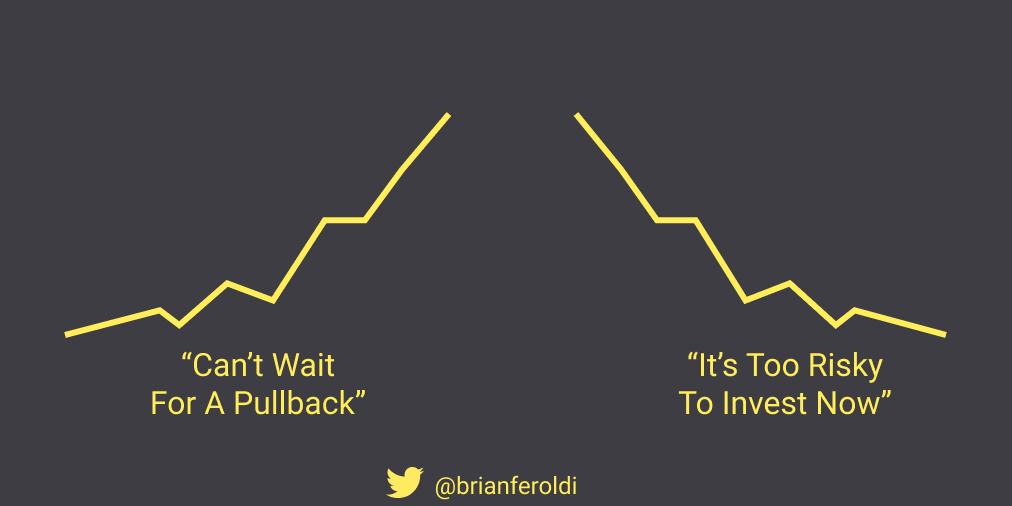The 6 most common investment mistakes and how you can fix them

On the 6th day of Christmas, Livewire gave to me…
Six big blunders – the most common investment mistakes and how you can fix them.
Ever piled into too many tech stocks (or whatever the flavour of the month may be) without thinking about your broader portfolio? Or perhaps you’ve tried to buy or sell based on what the market is doing, only to crystallise your losses?
If you have done either of these – or made any number of investing errors – join the club. I’m not sure I’ve met an investor who has never made a single error in their portfolio before. And besides, learning from your mistakes makes you a better investor overall.
While I’m sure I could name a few common errors based off my own mistakes, I decided to go to the experts and see what they most typically see from their client portfolios and how they go about fixing them. Sharing their tips and the blunders they most commonly see were:
- Sarah King, Stockspot
- Hugh Robertson, Centaur Financial Services
As a spoiler, true diversification is the solution to so many of the mistakes we make as investors.

Mistake 1: Lack of diversification
Finance’s only free lunch also matches up with the standout error both King and Roberston see in clients, with some clients overly focused on just one or more sectors or misunderstanding the idea of diversification. There’s also the Australian home-bias when it comes to equities investment meaning clients are missing opportunities from abroad.
“Some clients consider diversification to be spreading money across multiple banks instead of multiple sectors and only at the big end of town. They don’t have defensive assets and aren’t protected when the share market has a downturn,” says Robertson.
King notes she’s seen clients who will feel comfortable in their diversification, but only hold their money in one ETF – while it might be spread across different equities, they aren’t diversified by asset class or region.
“When people construct their own portfolios, they often forget the importance of defensive assets like bonds or gold. In period of volatility, you want to have those levels of protection. Gold was the best performing asset class in our portfolios in the last year, for example,” says King.
Each aim to fix a lack of diversification by approaching the client’s strategy and rebuilding around that. If this requires selling some assets to create diversification, then Robertson also considers tax implications and how to carefully rebalance a portfolio over a longer period of time if needed.
The thing to remember when getting back to basics like diversification feels like a drag?
“You can’t buy your insurance after the fact,” says Robertson.
Think of diversification as your insurance for all market situations, good and bad.
Mistake 2: Chasing trendy topics, themes or asset classes or that hot tip from a mate
“Taking a tip from a mate at the golf club and you want to get into it. You think you can’t lose. Then instead of just doing a small amount, you try to catch the returns you think you’ve missed and put double into something you’ve never done the research on. You double up on the risk – and then it fails and you think the share market is too risky,” says Robertson.

It’s easy to get caught up in the hype of a mate’s hot tip or that topic which is all over the news. AI has been the topic of the minute for over a year now and King mentions it’s the one that all her clients want to pile in on.
There’s nothing wrong with being keen to be part of a big trend if you do it carefully.
“If you want to chase a theme, you need to make sure you have exposure to a mix of sectors, countries, regions in the event they underperform – and that time will inevitably come,” says King.
Think not just Magnificent Seven, but stocks in other countries which have exposure to AI but may not specifically be tech sector stocks. It all harkens back to diversification – and of course, doing your research.
Mistake 3: Timing the market
Even the experts have trouble picking the peak or the trough of a market – it’s usually in hindsight we can see it. But buying or selling on the basis of what you think a market is doing is fraught with danger.
You could crystallise losses or miss true gains because you didn’t hold on. It’s also worth considering that we’ve been discussing the timing of a recession for the better part of two years now and we still don’t have a clear view on whether it will happen or not, let alone the extent of said recession. If you’d sold last year for a recession, there’s a lot of market gains that you would have missed in 2024.
“Often, if you are timing the market for a fall, you can miss it because the market bounces very quickly. A better approach to that would be to dollar cost average which can give you peace of mind as you can just drip feed smaller amounts in regularly. If there’s a bigger fall and you have extra money, you could always accelerate putting more money in,” says King.
As the saying goes, it’s all about Time in the Market not Timing the Market that will build your wealth in the end.
Mistake 4: Ignoring tax and structuring
Life’s great certainties are death and taxes – so why aren’t we remembering to factor tax into how we invest?
This is more than just what does it mean for my tax implications if I sell now compared to later, this is also considering the vehicle you use for your investments.
“If you set up your investments with the right structure and pay attention to your tax, you can get better investment outcomes,” says Robertson.
He’s seen clients who may have been better off using a self-managed super fund structure facing decisions about not selling shares when they probably should because of the tax constraints.
He also has clients who have seen significant capital gains in a particular investment they’ve held for many years, like Commonwealth Bank, and to sell it down now would leave them worse off overall due to the tax implications. It then requires a careful strategy about how to carefully rebalance over a longer period and then invest into other diversified assets.
Mistake 5: Chasing last year’s winner
To quote Mad Max: One day, cock of the walk. Next, a feather duster.
While investing is not always as extreme as that, today’s winner is not always tomorrow’s winner. Nvidia has been a star performer this year, but there’s no guarantee it will be next year. Gold has also been a standout asset this year while global equities took the cake in 2023 – but next year could be an entirely different story.
I’m sure lithium investors would also have a bit to say on this matter after a challenging 2024.
Once again, this all comes back to proper diversification.
“Being truly diversified means you have a mix of different assets that aren’t correlated to each other and can counterbalance each other. It’s not normal for everything to go up at the same time. There will often be assets that are going down while others are going up. You need to look at your portfolio as a whole, not just the individual components,” says King.
Mistake 6: Lack of patience and the ‘get rich quick’ mindset
Everyone dreams of that investment that is going to suddenly make you rich beyond your wildest dreams. The world is full of people right now bemoaning that they put everything into Bitcoin years ago – but equally that could have blown everything for you.
“Everything you like is on the other side of hard. That applies to self-development, investing, everything in life. You need discipline, to stick to a long-term plan and know the purpose of an investment,” says Robertson.
He points out that the key reason you diversify “isn’t to make an extra return, it’s to reduce the risk of your decisions being wrong. To add insurance into your portfolio.”
Robertson highlights that the power of compounding, staying the course and consistent behaviour has offered very satisfactory returns over the long-term.
Equally, not trying to jump about on opportunities and market activity, to hold your course is part of being patient and disciplined.
“Sticking with your strategy is really important because the more you chop and change, the more you trigger transaction costs, tax events and potentially crystallise losses and miss out on future opportunities to compound,” says King.
“If your strategy still fits and the portfolio still matches with that strategy, there should be no reason to change it up today,” King adds.
The biggest tips the experts have
At this time of the year, you’ll see predictions everywhere – and King would like you to be wary.
“Don’t listen to predictions. There’s often a lot of them at this time of the year and at the beginning of the year. They are plagued with issues. Things that don’t eventuate and throw you off track from your investing goals,” she says.
For Robertson, he wants investors to keep the power of compounding in mind and remember, “time is the enemy of a bad investment but the friend of a wonderful investment.”
Both remind investors that no cycle lasts forever – so don’t get bogged down in today and think across time.
A final question for fun… dream clients
Want to know who the experts would love to have on their books? Wonder no more as Robertson and King shared their favourite celebrities.
King would love to have Olympian Jessica Fox as a client.
“She’s so inspiring, has great energy and I think she’d be awesome to provide investment advice to. Just imagine her applying the discipline from her daily life to investing,” says King.

Robertson’s perfect pick would be Amazon’s Jeff Bezos.
“One time he was on The Tonight Show with Jay Leno and Leno laughed at him, pointing out he was losing billions of dollars. It was during the Tech Wreck. Bezos just laughed it off, he had this belief in his vision and I’d love to understand how he was able to have that fortitude and strength to keep believing in what he was trying to build,” he says.

He also likes The Rock (Dwayne Johnson) and Ryan Reynolds because they’ve been able to convert their Hollywood fame into business chains, and from a sport perspective, he'd love a chat with either Tiger Woods or Michael Jordan.
Do you have any investment mistakes you’d like to caution other readers about? Let us know in the comments.
2 topics

